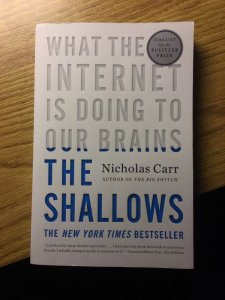“There’s nothing wrong with technology. It’s a tool; it’s all about how you use it.”
I’m sure you’ve heard that before. You’ve probably said it yourself. It’s become a cliche at this point, but it would be good to subject it to critical evaluation. What role should technology play in our lives? We use it, we’re attached to it, and we find ourselves adjusting to it almost without a second thought. Just a few decades ago, there were no smartphones, no internet. These days, if you’re like most people, the idea of going a whole day without your phone seems unthinkable. Our phones are essential to our survival, are they not?
At first glance, the changes seem great. It may be a good idea, however, to ask certain questions as we ponder whether these changes have been to the good. For example, what things might you be sacrificing as technology rapidly takes up a larger and larger share of your life? If you’re anything like me, you worry about it, at least a little. But too often it doesn’t go deeper than that tinge of guilt after you’ve spent three hours watching dumb videos on YouTube.
This is why I suggest you read Nicholas Carr’s book The Shallows: What the Internet is Doing to Our Brains. It’s a fascinating look at just how technology is affecting us culturally, what it does to our brains, and why we should be concerned about it.
Carr explains that our brains are being trained to process information much more quickly. With our ever-increasing access to information online, we’re able to find exactly what we’re looking for with virtually no effort. We perform a quick google search, finish messaging a friend, look at the latest stories on Instagram, then try to read a bit of a novel. It’s so much content, much of it visually stimulating, being flashed before us at an astonishing rate. And it’s amazing how flexible our brains are. They do adjust, enabling us to process much faster. Fans of technology are quick to point this out. What could be wrong with new tools that give us more information and make it easier to communicate with more people?
Well, there’s a big catch. As our brains adjust to the rapid-fire world of our devices, our ability to deeply process and reflect goes down. Our short term memory is bolstered at the expense of long term memory. As we try to keep up with the latest digital craze, we risk losing the very things that once defined advanced society. Modern civilization has given us the luxury of being able to step back and focus on developing specific skills and pursuits of knowledge, with only a small amount of our energy going towards ensuring mere survival. But as our devices consume our attention, are we slipping backwards? The process of deep reading, the ability to become fully engrossed in a great book, is an invaluable experience that is at the core of some of the most meaningful pursuits of wisdom. Have we forgotten this, as our attention is constantly pulled in multiple directions? We don’t read in this way as much as we once did.
Carr published his book in 2010 and we’re in much more trouble today, less than a decade later. But I love this book because I find its perspective inspiring. There are moments of remorse that I experienced here, as I realized what I’ve sacrificed. But more importantly, I was drawn to this world of more reflection, profound discovery, and richer relationships.
I’d be delighted if you could experience the same hunger I acquired from this book. As Christians, we should be more concerned about how well we are able to process and meditate, certainly not less. There are many questions, especially of a practical nature, that this book is sure to raise. If we continue to avoid the uncomfortable questions, we put ourselves at great risk. This book is a great place to start asking them.
Check out this book on Amazon!
________________________
Photo credits: https://offerup.com/item/detail/610541348/

Amen! Very convicting. I’ve noticed that the more time I spend surfing the internet the less memory and sharpness I have. May the Lord refine His church and may we be faithful to Him!!